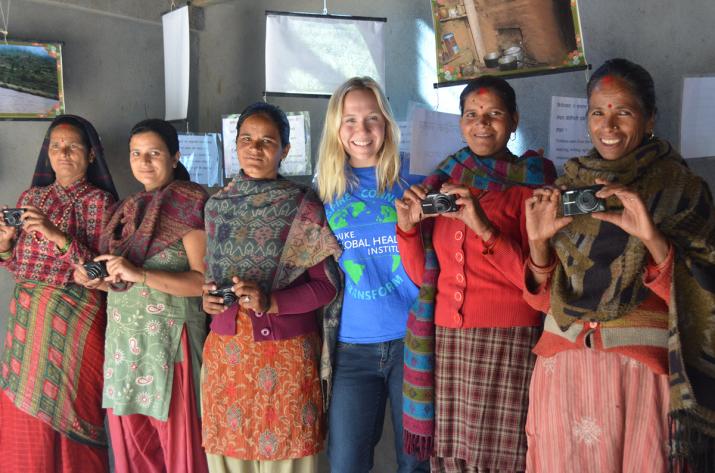
Libby MacFarlane '16 (center) with a group of the photovoice study participants at the opening of their photography exhibit, "Voices of the community: Women's perceptions of environmental change and health in Jumla"
Published May 26, 2015 under Research News
In a study published this month in BJ Psych International, Master of Science in Global Health student Libby MacFarlane found that the “photovoice” research methodology can play an important role for women in a vulnerable low-income country deal with climate change and help promote mental health.
She and her research team, including DGHI professor Brandon Kohrt, conducted the study in the Jumla region of Nepal, where the very real threat of landslides, drought and severe hailstorms is potentially further exacerbated by climate change.
What Is Photovoice?
Photovoice is a community-based participatory research methodology that uses photos taken by participants to deconstruct problems and questions raised by community members, with the goal of generating practical solutions. This approach is designed to empower community members in identifying and addressing their own needs.
Photos Spark Conversation and Strategies
In this study, participants learned how to use cameras and then formulated questions related to climate change and mental health (e.g., “How will water scarcity affect our well-being?”). Participants took photos related to their questions and shared their images during sessions with the other participants, where they talked about the photos using a standard photovoice discussion format.
In the final session, the research team and participants reviewed the themes that had emerged from the discussions. At the end of the project, the women showcased their photos at two exhibits in the community.
Pre- and Post-Interviews Suggest Important Role for Photovoice
From the exit interviews, the researchers identified three themes:
- Sharing environmental best practices is helpful.
- Building community capacity to adapt to and mitigate environmental issues in the community is important.
- Sharing stories can build confidence and ease pain.
The research team also concluded that photovoice can help identify local resources (e.g., women’s groups), generate strategies for adapting to climate change and strengthen emotional resilience.
MacFarlane’s Connection to Nepal Extends Far beyond the Study
MacFarlane, who is pursuing a dual master's degree in global health and business at Duke, says that Nepal and South Asia hold a “special place in her heart.” Prior to coming to Duke, she took a sabbatical from her management consulting job to embark on a four-month solo global health trip to Thailand, China and Nepal, where she explored health systems, integrative medicine and alternative therapies. It was during this trip that she fell in love with Nepal, feeling a deep connection with both the landscape and the people.
Shortly after she began her master’s program at DGHI, she began working with Brandon Kohrt on global mental health research in Nepal. In 2013, she traveled to Nepal to do a field assessment for her proposed thesis topic and attended a climate change conference, where she met her future collaborator, Renu Shakya, on the photovoice study.
That trip to Nepal helped MacFarlane see that she could combine her background in economics and environmental studies with her passion for global mental health. She soon realized that Nepal—a country known for its vulnerability to natural disasters and climate change—would be a perfect setting for her research pursuits.
In 2014, she and Kohrt deepened their commitment to the people of Nepal by co-founding a non-profit organization, HeartMind International (HMI), with Robert Koenig, producer and director of the documentary film “Returned: Child Soldiers of Nepal’s Maoist Army.” The organization partners with Nepal’s Transcultural Psychosocial Organization (TPO), to provide culturally-appropriate, sustainable mental health care to vulnerable populations around the world, especially those in rural areas in Nepal, other regions of South Asia and the South Asian diaspora. MacFarlane is the vice president and director of HMI.
MacFarlane Now Mobilizing for Post-Earthquake Mental Health Relief
With the recent earthquakes, MacFarlane’s experience studying mental health in Nepal has suddenly taken on a new significance. HMI is raising funds to support Nepal’s psychological aid efforts and collaborating with TPO to provide services to earthquake survivors.
Meanwhile, MacFarlane, Kohrt and colleagues within and beyond Duke are developing a resource to help aid organizations that are unfamiliar with Nepal understand the cultural context to assist them in providing appropriate response services. This resource—a “desk review”—is the product of an extensive literature review that sheds light on Nepali culture from gender, political, historical, religious and other perspectives.
MacFarlane is concerned about the long-term mental health and well-being of the people of Nepal in the years following the earthquake. Addressing the trauma, anxiety and fear across the country sooner rather than later, she says, is critical to the rebuilding effort. She hopes to return to Nepal sometime this year to reconnect with colleagues and friends and learn more about how she and HMI can best participate in this process.
Photovoice can help identify local resources (e.g., women’s groups), generate strategies for adapting to climate change and strengthen emotional resilience.

